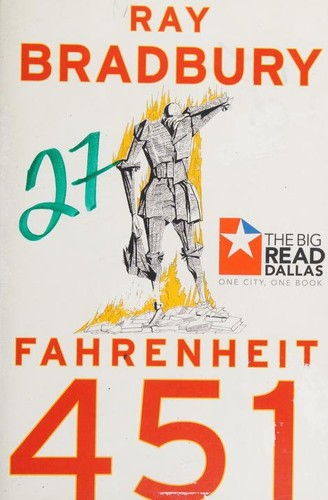Taru Luojola reviewed Fahrenheit 451 by Ray Bradbury
Eilispäivän scifi on näköjään tämän päivän realismia
4 stars
Tämä tulee kyllä nyt ihan liian lähelle. Torment Nexus kuvattiin varoitukseksi, ei tavoitteeksi.

Paperback, 159 pages
English language
Published March 31, 2013 by Simon & Schuster Paperbacks.
Fahrenheit 451 is a 1953 dystopian novel by American writer Ray Bradbury. Often regarded as one of his best works, the novel presents a future American society where books are outlawed and "firemen" burn any that are found. The book's tagline explains the title as "'the temperature at which book paper catches fire, and burns": the autoignition temperature of paper. The lead character, Guy Montag, is a fireman who becomes disillusioned with his role of censoring literature and destroying knowledge, eventually quitting his job and committing himself to the preservation of literary and cultural writings.
The novel has been the subject of interpretations focusing on the historical role of book burning in suppressing dissenting ideas for change. In a 1956 radio interview, Bradbury said that he wrote Fahrenheit 451 because of his concerns at the time (during the McCarthy era) about the threat of book burning in the United States. …
Fahrenheit 451 is a 1953 dystopian novel by American writer Ray Bradbury. Often regarded as one of his best works, the novel presents a future American society where books are outlawed and "firemen" burn any that are found. The book's tagline explains the title as "'the temperature at which book paper catches fire, and burns": the autoignition temperature of paper. The lead character, Guy Montag, is a fireman who becomes disillusioned with his role of censoring literature and destroying knowledge, eventually quitting his job and committing himself to the preservation of literary and cultural writings.
The novel has been the subject of interpretations focusing on the historical role of book burning in suppressing dissenting ideas for change. In a 1956 radio interview, Bradbury said that he wrote Fahrenheit 451 because of his concerns at the time (during the McCarthy era) about the threat of book burning in the United States. In later years, he described the book as a commentary on how mass media reduces interest in reading literature.
In 1954, Fahrenheit 451 won the American Academy of Arts and Letters Award in Literature and the Commonwealth Club of California Gold Medal. It later won the Prometheus "Hall of Fame" Award in 1984 and a "Retro" Hugo Award, one of a limited number of Best Novel Retro Hugos ever given, in 2004. Bradbury was honored with a Spoken Word Grammy nomination for his 1976 audiobook version.
Also contained in:
Tämä tulee kyllä nyt ihan liian lähelle. Torment Nexus kuvattiin varoitukseksi, ei tavoitteeksi.
There are so many quotes that I have taken away from this book and that I will carry with me for the rest of my life. I think one of the main (or, most impactful) ones is 'if you drown, at least die knowing you were heading for shore' - such a beautiful way of saying die doing what's right. It reminds me of the quote from Stéphane Charbonnier who stated, 'I'd rather die standing than live on my knees' (he was later killed by Islamic terrorists who did not agree with the viewpoints he published). I know that many people reading this review might argue that I should have read this book earlier in my life (and they're likely right) but I want to attempt to rebut this by saying that I think, if I were to read Fahrenheit 451 at any younger age, I might not have been …
There are so many quotes that I have taken away from this book and that I will carry with me for the rest of my life. I think one of the main (or, most impactful) ones is 'if you drown, at least die knowing you were heading for shore' - such a beautiful way of saying die doing what's right. It reminds me of the quote from Stéphane Charbonnier who stated, 'I'd rather die standing than live on my knees' (he was later killed by Islamic terrorists who did not agree with the viewpoints he published). I know that many people reading this review might argue that I should have read this book earlier in my life (and they're likely right) but I want to attempt to rebut this by saying that I think, if I were to read Fahrenheit 451 at any younger age, I might not have been able to take away as much as I did reading it this time. I'm currently 19 years old, though Fahrenheit was actually one of the first books I ever purchased. It had a beautiful animated cover and came along with Brave New World (which had 3D glasses tucked behind the first page so that you could view the cover image from a different perspective); whilst I would have been able to read both books in my youth, I'm somewhat glad I didn't as I worry I might have ruined them, spoilt them for myself. F451 made me feel so electric with every single word, page, and character. With every single location, event, and detail. It took a little time getting used to the writing style but once I was into it, I was completely in. Sidenote, the detail of the vent in Montag's house was wonderfully done and felt so suspenseful.
'Stuff your eyes with wonder.'